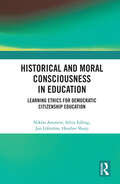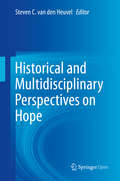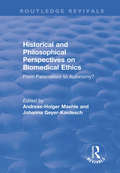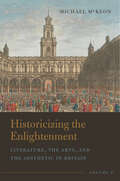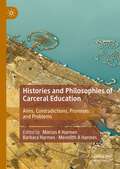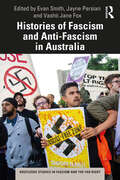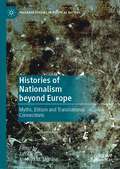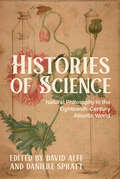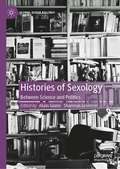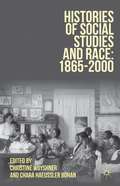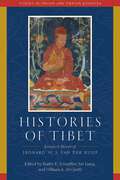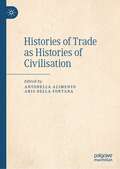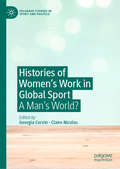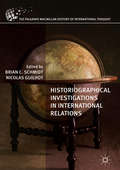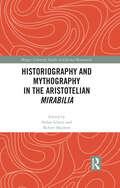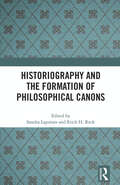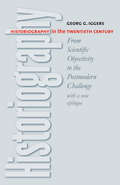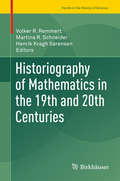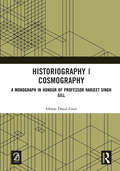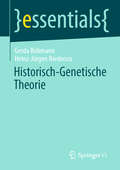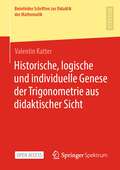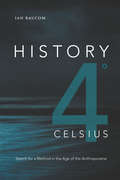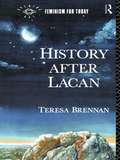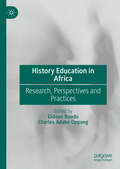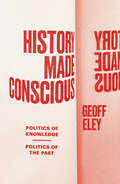- Table View
- List View
Historical and Moral Consciousness in Education: Learning Ethics for Democratic Citizenship Education
by Silvia Edling Heather Sharp Niklas Ammert Jan LöfströmHistorical and Moral Consciousness highlights how ethics can be understood in the context of History education. It analyses the qualitative differences in how young people respond to historical and moral dilemmas of relevance to democratic values and human rights education. Drawing on a four-year international project, the book offers nuanced discussion and new scholarly understanding of the intersections between historical consciousness and moral consciousness within research. It develops new theoretical tools for history teaching and learning that can support teachers as they endeavor to educate for democratic citizenship. The book includes a meta-analysis of research within history Didaktik and around historical events with a moral bearing, and presents a comparative study of Australian, Finnish, and Swedish high school students’ moral understandings of historical dilemmas. Raising important questions about how our learning from the past is intertwined with our present and future interpretations and judgements, this book will be of great interest to academics, scholars, teachers, and post graduate students in the fields of history education, democratic education, human rights education, and citizenship education.
Historical and Multidisciplinary Perspectives on Hope
by Steven C. van den HeuvelThis open access volume makes an important contribution to the ongoing research on hope theory by combining insights from both its long history and its increasing multi-disciplinarity. In the first part, it recognizes the importance of the centuries-old reflection on hope by offering historical perspectives and tracing it back to ancient Greek philosophy. At the same time, it provides novel perspectives on often-overlooked historical theories and developments and challenges established views. The second part of the volume documents the state of the art of current research in hope across eight disciplines, which are philosophy, theology, psychology, economy, sociology, health studies, ecology, and development studies. Taken together, this volume provides an integrated view on hope as a multi-faced phenomenon. It contributes to the further understanding of hope as an essential human capacity, with the possibility of transforming our human societies.
Historical and Philosophical Perspectives on Biomedical Ethics: From Paternalism to Autonomy? (Routledge Revivals)
by Andreas-Holger Maehle Johanna Geyer-KordeschThis title was first published in 2002: This volume discusses the subject of biomedical ethics. Various views, historical and contemporary, are discussed, with the editors using the contrasting concepts in the shift from paternalism to autonomy in 20th-century medicine as a heuristic tool for the critical study of ethics in medicine.As far as the evidence in this volume goes, paternalistic medical practices and patient autonomy had an uneasy relationship by the beginning of the 20th century. A hundred years later, full autonomy in decisions on medical treatment is still subject to numerous caveats. The text pays close attention to the interplay between various players, noting how factors such as social contexts, governmental organizations and the biotechnological industry influence and shape responses to the principle of bioethics.
Historicizing the Enlightenment, Volume 2: Literature, the Arts, and the Aesthetic in Britain
by Michael McKeonEnlightenment critics from Dryden through Johnson and Wordsworth conceived the modern view that art and especially literature entails a double reflection: a reflection of the world, and a reflection on the process by which that reflection is accomplished. Instead “neoclassicism” and “Augustanism” have been falsely construed as involving a one-dimensional imitation of classical texts and an unselfconscious representation of the world. In fact these Enlightenment movements adopted an oblique perspective that registers the distance between past tradition and its present reenactment, between representation and presence. Two modern movements, Romanticism and modernism, have appropriated as their own these innovations, which derive from Enlightenment thought. Both of these movements ground their error in a misreading of “imitation” as understood by Aristotle and his Enlightenment proponents. Rightly understood, neoclassical imitation, constitutively aware of the difference between what it knows and how it knows it, is an experimental inquiry that generates a range of prefixes—“counter-,” “mock-,” “anti-,” “neo-”—that mark formal degrees of its epistemological detachment. Romantic ideology has denied the role of the imagination in Enlightenment imitation, imposing on the eighteenth century a dichotomous periodization: duplication versus imagination, the mirror versus the lamp. Structuralist ideology has dichotomized narration and description, form and content, structure and history. Poststructuralist ideology has propounded for the novel a contradictory “novel tradition”—realism, modernism, postmodernism, postcolonialism—whose stages both constitute a sequence and collapse it, each stage claiming the innovation of the stage that precedes it. Published by Bucknell University Press. Distributed worldwide by Rutgers University Press.
Histories and Philosophies of Carceral Education: Aims, Contradictions, Promises and Problems
by Barbara Harmes Marcus K Harmes Meredith A HarmesThis edited collection encourages philosophical exploration of the nature, aims, contradictions, promises and problems of the practice of education within prisons around the world. Such exploration is particularly necessary given the complex operational barriers to education, and higher education in particular, within prison-based teaching and learning. These operational barriers are matched by cultural and polemical barriers, such as the criticism of diverting resources to and spending money on prisoner education when the cost of some education seems prohibitive for people outside prison. More so than in other education contexts, prison education may fall short of higher ideals because it is shot through with both practical and moral-political problems and challenges, especially in the age of global late capitalism, high technology and mass incarceration or securitization. This book includes insights and issues around a wide range of areas including: ethics, religion, sociology, justice, identity and political and moral philosophy.
Histories of Fascism and Anti-Fascism in Australia (Routledge Studies in Fascism and the Far Right)
by Evan Smith Jayne Persian Vashti Jane FoxHistories of Fascism and Anti-Fascism in Australia provides a history of fascist movements and anti-fascist resistance in Australia over the past century.In recent years, the far right has become a resurgent force across the globe, resulting in populist parties securing electoral victories, social movements organising on the streets, and acts of right-wing terrorism. Australia has not been immune to this. However, this is not merely a recent phenomenon; it has a long history of fascist and far-right groups and individuals. These groups have attempted to situate themselves within the wider settler colonial political landscape, often portraying themselves as the inheritors of a violent and exclusionary colonial past. Concurrently, these groups have linked into globalised anti-communist and white supremacist networks. At the same time, Australia has often seen resistance to fascism and the far right, from the political centre to the far left. Covering the period from the 1920s to the present day, and featuring insights from historians, sociologists, and political scientists, this book provides the most detailed account of this fascinating and important topic. This book will be of interest to students and activists with an interest in the extreme right and anti-fascism as well as Australian history, politics, and society.
Histories of Nationalism beyond Europe: Myths, Elitism and Transnational Connections (Palgrave Studies in Political History)
by Jan Záhořík Antonio M. MoroneThis edited collection explores varying shapes of nationalism in different regional and historical settings in order to analyse the important role that nationalism has played in shaping the contemporary world. Taking a global approach, the collection includes case studies from the Middle East, Africa, Asia and North America. Unique not only in its wide range of geographically diverse case studies, this book is also innovative due to its comparative approach that combines different perspectives on how nations have been understood and how they came into being, highlighting the transnational connections between various countries. The authors examine what is meant by the concepts of ‘nation’ and ‘national identity,’ discussing themes such as citizenship, ethnicity, historical symbols and the role of elites. By exploring these entangled categories of nationalism, the authors argue that throughout history, elites have created ‘artificial ’ versions of nationalism through symbolism and mythology, which has led to nationalism being understood through social constructivist or primordialist lenses. This diverse collection will appeal to researchers studying nationalism, including historians, political scientists and anthropologists.
Histories of Science: Natural Philosophy in the Eighteenth-Century Atlantic World
by David Alff Danielle SprattSpreading the news of scientific breakthroughs in the eighteenth centuryHistories of Science shows how different forms of media communicated scientific breakthroughs during the long eighteenth century, bringing together eighteen humanities scholars to discuss the representation, reception, and application of natural philosophy in the Atlantic world. In particular, the authors focus on descriptions of scientific discoveries in popular print, with essays on topics as varied as placebo pills, irrigation systems, and navigational technology. And while each contributor advances a discrete argument, the collection coheres in its shared questions of methodology, historicity, and ethics. Histories of Science expands our record of the past, our understanding of the present, and our ability to imagine the future.
Histories of Sexology: Between Science and Politics (Global Queer Politics)
by Alain Giami Sharman LevinsonHistories of Sexology: Between Science and Politics takes an interdisciplinary and reflexive approach to the historiography of sexology. Drawing on an intellectual history perspective informed by recent developments in science and technology studies and political history of science, this book examines specific social, cultural, intellectual, scientific and political contexts that have given shape to theories of sexuality, but also to practices in medicine, psychology, education and sexology. Furthermore, it explores various ways that theories of sexuality have both informed and been produced by sexologies—as scientific and clinical discourses about sex—in Western countries since the 19th century.
Histories of Social Studies and Race: 1865–2000
by Christine Woyshner Chara Haeussler BohanIn Histories of Social Studies and Race: 1865-2000, researchers investigate the interplay of race and the emerging social studies field from the time of the Emancipation of enslaved peoples in the second half of the nineteenth century to the multicultural and Afrocentric education initiatives of the late-twentieth century. The chapters incorporate viewpoints from various regions and local communities, as well as different ideas and ideals regarding teaching about race and Black history. This volume makes a case for considering the goals of such efforts - whether for individual development or social justice - and views the teaching of social studies education through the lens of race.
Histories of Tibet: Essays in Honor of Leonard W. J. van der Kuijp
by Kurtis R. Schaeffer, Jue Liang, and William A. McGrathThe thirty-four essays in this volume follow the particular interests of Leonard van der Kuijp, whose groundbreaking research in Tibetan intellectual and cultural history imbued his students with an abiding sense of curiosity and discovery.As part of Leonard van der Kuijp&’s research in Tibetan history, as he patiently and expertly revealed treasures of the Tibetan intellectual tradition in fourteenth-century Tsang, or seventeenth-century Lhasa, or eighteenth-century Amdo, he developed an international community of colleagues and students. The thirty-four essays in this volume follow the particular interests of the honoree and express the comprehensive research that his international cohort have engaged in alongside his generous tutelage over the course of forty years. He imbued his students with the abiding sense of curiosity and discovery that can be experienced through every one of his writings, and that can be found as well in these new essays in intellectual, cultural, and institutional history by Christopher Beckwith, the late Hubert Decleer, Franz-Karl Ehrhard, Jörg Heimbel and David Jackson, Isabelle Henrion-Dourcy, Nathan Hill, Matthew Kapstein, Kurtis Schaeffer, Michael Witzel, Allison Aitken, Yael Bentor, Pieter Verhagen, Todd Lewis, William McGrath, Peter Schwieger, Gray Tuttle, and others.
Histories of Trade as Histories of Civilisation
by Antonella Alimento Aris Della FontanaThis edited collection explores the histories of trade, a peculiar literary genre that emerged in the context of the historiographical and cultural changes promoted by the histoire philosophique movement. It marked a discontinuity with erudition and antiquarianism, and interacted critically with universal history. By comparing and linking the histories of individual peoples within a common historical process, this genre enriched the reflection on civilisation that emerged during the long eighteenth century. Those who looked to the past wanted to understand the political constitutions and manners most appropriate to commerce, and grasp the recurring mechanisms underlying economic development. In this sense, histories of trade constituted a declination of eighteenth-century political economy, and thus became an invaluable analytical and practical tool for a galaxy of academic scholars, journalists, lawyers, administrators, diplomats and government ministers whose ambition was to reform the political, social and economic structure of their nations. Moreover, thanks to these investigations, a lucid awareness of historical temporality and, more particularly, the irrepressible precariousness of economic hegemonies, developed. However, as a field of tension in which multiple and even divergent intellectual sensibilities met, this literary genre also found space for critical assessments that focused on the ambivalence and dangers of commercial civilisation. Examining the complex relationship between the production of wealth and civilisation, this book provides unique insights for scholars of political economy, intellectual history and economic history.
Histories of Women's Work in Global Sport: A Man’s World? (Palgrave Studies in Sport and Politics)
by Georgia Cervin Claire NicolasSport has never been a man’s world. As this volume shows, women have served key roles not only as athletes and spectators, but as administrators, workers, decision-makers, and leaders in sporting organizations around the world. Contributors excavate scarce archival material to uncover histories of women’s work in sport, from swimming teachers in nineteenth-century England to national sports administrators in twentieth-century Côte d’Ivoire, and many places in between. Their work has been varied, holding roles as teachers, wives, and secretaries in sporting contexts around the world, often with diplomatic functions—including at the 1968 and 1992 Olympic Games. Finally, this collection shows how gender initiatives have developed in sporting institutions in Europe and international sport federations today. With a foreword by Grégory Quin and afterword by Anaïs Bohuon, this is a pioneering study into gender and women’s work in global sport.
Historiographical Investigations in International Relations (The Palgrave Macmillan History of International Thought)
by Nicolas Guilhot Brian C. SchmidtThis book critically investigates the historiography of International Relations. For the past fifteen years, the field has witnessed the development of a strong interest in the history of the discipline. The chapters in this edited volume, written by some of the field’s preeminent disciplinary historians, all manifest the best of an innovative and exciting generation of scholarship on the history of the discipline of International Relations. One of the objectives of this volume is to take stock of the historical turn. Yet this volume is not simply a stock-taking exercise, as it also intends to identify the limitations and blind spots of the recent historiographical literature. The chapters consider a range of diverse thinkers and examine their impact on understanding various dimensions of the field’s history.
Historiography and Mythography in the Aristotelian Mirabilia (Rutgers University Studies in Classical Humanities)
by Robert Mayhew Stefan SchornThis is the first full-length volume in English that focuses on the historiographical section of the Mirabilia or De mirabilibus auscultationibus (On Marvelous Things Heard), attributed to Aristotle but not in fact by him. The central section of the Mirabilia, namely §§ 78–151, for the most part deals with historiographical material, with many of its entries having some relationship to ancient Greek historians of the 4th and 3rd centuries BC. The chapters in this volume discuss various aspects of this portion of the text, including textual issues involving toponyms; possible structural principles behind the organization of this section; the passages on Theopompus and Timaeus; mythography; the philosopher Heracleides of Pontos; Homeric exegesis; and the interrelationship between pseudo-Plutarch’s On Rivers, a section of the historian Stobaeus’ Geography, and the Mirabilia. Historiography and Mythography in the Aristotelian Mirabilia is an invaluable resource for scholars and students of this text, and of Greek philosophy, historiography, and literature more broadly.
Historiography and the Formation of Philosophical Canons
by Sandra Lapointe Erich H. ReckThis book presents a series of case studies and reflections on the historiographical assumptions, methods and approaches that shape the way in which philosophers construct their own past. The chapters in the volume advance discussion of the methods of historians of philosophy, while at the same time illustrating the various ways in which philosophical canons come into existence, debunking the myth of analytical philosophy’s ahistoricism and providing a deeper understanding of the roles historiographical devices play in philosophical thought. More importantly, the contributors attempt to understand history of philosophy in connection with other historical and historiographical approaches: contributors engage classical history of science, sociology of knowledge, history of psychology and historiography, in dialogue with historiographical practices in philosophy more narrowly construed. Additionally, select chapters adopt a more diverse perspective, by making place for non-Western approaches and for efforts to construe new philosophical narratives that do justice to the voice of women across the centuries. Historiography and the Formation of Philosophical Canons will be of interest to researchers and advanced students working in history of philosophy, meta-philosophy, philosophy of history, historiography, intellectual history and sociology of knowledge.
Historiography in the Twentieth Century: From Scientific Objectivity to the Postmodern Challenge
by Georg G. Iggers&“No one looking for a well-informed introduction to . . the key views of history adopted by professional historians . . could find a better one than this.&” ―Richard J. Evans, author of In Defence of History A broad perspective on historical thought and writing, with a new epilogue. In this book, now published in ten languages, a preeminent intellectual historian examines the profound changes in ideas about the nature of history and historiography. Georg G. Iggers traces the basic assumptions upon which historical research and writing have been based, and describes how the newly emerging social sciences transformed historiography following World War II. The discipline&’s greatest challenge may have come in the last two decades, when postmodern ideas forced a reevaluation of the relationship of historians to their subject and questioned the very possibility of objective history. Iggers sees the contemporary discipline as a hybrid, moving away from a classical, macrohistorical approach toward microhistory, cultural history, and the history of everyday life. The new epilogue, by the author, examines the movement away from postmodernism towards new social science approaches that give greater attention to cultural factors and to the problems of globalization. &“The book has all the virtues one associates with Georg Iggers—lucidity, detachment, balance, and the ability to reveal the relation between trends in historical writing and their political and cultural contexts.&” —Peter Burke, Cambridge University
Historiography of Mathematics in the 19th and 20th Centuries
by Volker R. Remmert Martina R. Schneider Henrik Kragh SørensenThis book addresses the historiography of mathematics as it was practiced during the 19th and 20th centuries by paying special attention to the cultural contexts in which the history of mathematics was written. In the 19th century, the history of mathematics was recorded by a diverse range of people trained in various fields and driven by different motivations and aims. These backgrounds often shaped not only their writing on the history of mathematics, but, in some instances, were also influential in their subsequent reception. During the period from roughly 1880-1940, mathematics modernized in important ways, with regard to its content, its conditions for cultivation, and its identity; and the writing of the history of mathematics played into the last part in particular. Parallel to the modernization of mathematics, the history of mathematics gradually evolved into a field of research with its own journals, societies and academic positions. Reflecting both a new professional identity and changes in its primary audience, various shifts of perspective in the way the history of mathematics was and is written can still be observed to this day. Initially concentrating on major internal, universal developments in certain sub-disciplines of mathematics, the field gradually gravitated towards a focus on contexts of knowledge production involving individuals, local practices, problems, communities, and networks. The goal of this book is to link these disciplinary and methodological changes in the history of mathematics to the broader cultural contexts of its practitioners, namely the historians of mathematics during the period in question.
Historiography | Cosmography: A Monograph in Honour of Professor Harjeet Singh Gill
by Ishwar Dayal GaurThis book attempts to study Panjab historiography from the viewpoint of cosmography, the concept derived from the cosmological paradigm which Professor Harjeet Singh Gill, an eminent semiotician, developed in his oeuvre. Since its introduction in the colonial Panjab, the discipline of historiography subdued the indigenous craft of history writing such as katha, qissa, janamsakhi, and jangnama wherein what Professor Gill has conceptualized as “the dialectic of representation and transcendence” remained ever active. This title has been co-published with Aakar Books. Print editions not for sale in South Asia (India, Sri Lanka, Nepal, Bangladesh, Pakistan and Bhutan)
Historisch-Genetische Theorie (essentials)
by Gerda Bohmann Heinz-Jürgen NiedenzuDie historisch-genetische Theorie verfolgt den Anspruch, die Genese der menschlichen kulturellen Lebensweise aus den naturgeschichtlichen Ausgangsbedingungen und die historisch differenten gesellschaftlichen Organisationsformen in ihrer Strukturfolge erklären zu können. Für die Theorie zentral ist das methodologische Primat ontogenetischer Entwicklungsprozesse. Die gesellschaftlichen Organisationsformen sind diesen konstruktiv verbunden, folgen in ihrer Entwicklung aber anderen Mechanismen. Es werden die Grundlagen der Theorie herausgearbeitet und auf deren zentrale Fragen und Themenbereiche eingegangen.
Historische, logische und individuelle Genese der Trigonometrie aus didaktischer Sicht (Bielefelder Schriften zur Didaktik der Mathematik #10)
by Valentin KatterIn diesem Open-Access-Buch führt Valentin Katter eine umfassende didaktisch orientierte Sachanalyse unter historisch-, logisch-, und individualgenetischen Gesichtspunkten durch, mit der es ihm möglich ist, systematisch sechs Grundvorstellungen zum Sinusbegriff zu identifizieren. Anhand detaillierter Videoanalysen zeigt der Autor anschließend, wie diese Grundvorstellungen genutzt werden können, um Denkprozesse von Lehramtsstudierenden in kooperativen Problemlösesituationen zu rekonstruieren. Diese Rekonstruktionen gewähren einen Einblick in das komplexe individuelle Netz von Vorstellungen und ermöglichen es, das Potential und mögliche Hindernisse, die in ihm stecken, auszuloten.
History 4° Celsius: Search for a Method in the Age of the Anthropocene (Theory in Forms)
by Ian BaucomIn History 4° Celsius Ian Baucom continues his inquiries into the place of the Black Atlantic in the making of the modern and postmodern world. Putting black studies into conversation with climate change, Baucom outlines how the ongoing concerns of critical race, diaspora, and postcolonial studies are crucial to understanding the Anthropocene. He draws on materialist and postmaterialist thought, Sartre, and the science of climate change to trace the ways in which evolving political, cultural, and natural history converge to shape a globally destructive force. Identifying the quest for limitless financial gain as the primary driving force behind both the slave trade and the continuing increase in global greenhouse gas emissions, Baucom demonstrates that climate change and the conditions of the Black Atlantic, colonialism, and the postcolony are fundamentally entwined. In so doing, he argues for the necessity of establishing a method of critical exchange between climate science, black studies, and the surrounding theoretical inquiries of humanism and posthumanism.
History After Lacan (Opening Out: Feminism for Today)
by Teresa BrennanLacan was not an ahistorical post-structuralist. Starting from this controversial premiss, Teresa Brennan tells the story of a social psychosis. She begins by recovering Lacan's neglected theory of history which argued that we are in the grip of a psychotic's era which began in the seventeenth century and climaxes in the present. By extending and elaborating Lacan's theory, Brennan develops a general theory of modernity. Contrary to postmodern assumptions, she argues, we need general historical explanation. An understanding of historical dynamics is essential if we are to make the connections between the outstanding facts of modernity - ethnocentrism, the relationship between the sexes and ecological catastrophe.
History Education in Africa: Research, Perspectives and Practices
by Gideon Boadu Charles Adabo OppongThis collection brings together African scholars in Africa and the diaspora to contribute to scholarly debates about critical issues in history teaching and learning in African schools. The book contributes to filling the gap in knowledge on African history, associated pedagogies and practices and its consequent effects on research and the declining popularity of history in African Schools. Specifically, the volume (a) examines current trends and practices in history education in African schools, (b) unveils the challenges and subtleties of teaching the next generation of teachers and students, and (c) examines classroom practices and opportunities for engagement with historical concepts in African schools. The book adds a much-needed African voice to the international history education literature and contribute to strengthening the place of history teaching and learning in Africa.
History Made Conscious: Politics of Knowledge, Politics of the Past
by Geoff EleyHow History has changed in the half-century since the 1960sDuring the last fifty years, the writing of history underwent two massive transformations. First, powered by Marxism and other materialist sociologies, the great social history wave instated the value of social explanation.Then, responding to new theoretical debates, the cultural turn upset many of those freshly earned certainties. Each challenge was profoundly informed by politics, from issues of class, gender, and race to those of identity, empire, and the postcolonial.The resulting controversies brought historians radically changed possibilities, expanding subject matters, unfamiliar approaches, greater openness to theory and other disciplines, a new place in the public culture. History Made Conscious offers snapshots of a discipline continuously rethinking its charge. How might we understand "the social" and "the cultural" together? How do we collaborate most fruitfully across disciplines? If we take theory seriously, how does that change what historians do? How should we think differently about politics?
